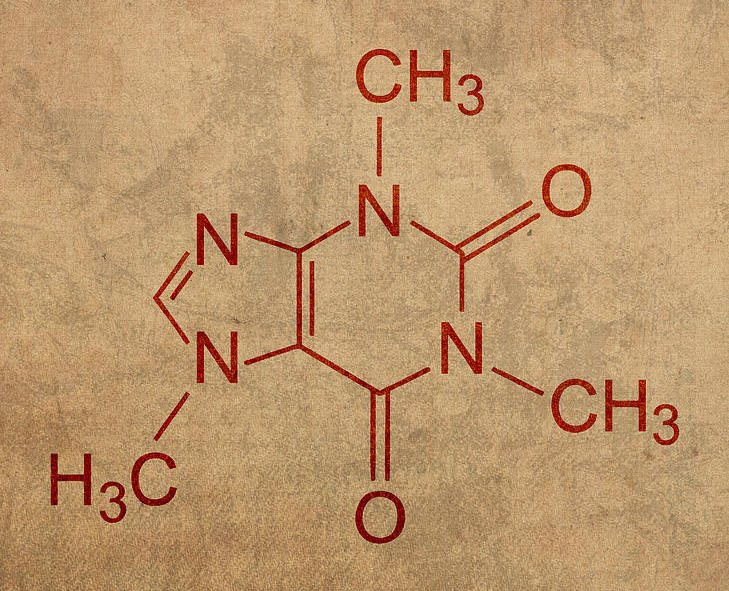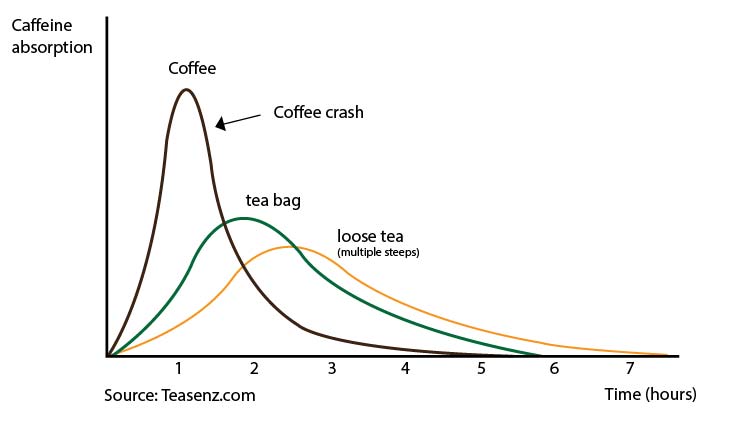Tea Caffeine: Does Tea Contain Caffeine?
Caffeine is found in a variety of food and drinks. Some of the most common and popular examples are tea, coffee and chocolate. While the average cup of coffee contains approximately 80 – 185 mg of caffeine per cup, while tea averages closer to 15 – 70 mg. In contrast, most herbal teas and flower teas contains no caffeine at all.
This article examines the factors involved in caffeine levels, as well as the positive and negative effects of consuming caffeinated beverages. So does tea contain caffeine? Yes, it does. Now let's discuss the details.
What Is Caffeine and How Does it Work?

Caffeine is a naturally-occurring stimulant, though sometimes it is added to things like soda pop and energy drinks. Its technical name is “trimethylxanthine”. As many people are aware, it is known to be an addictive substance.
There is a chemical in our bodies called adenosine that binds itself to our adenosine receptors, slowing down nerve cell activity and making us feel drowsy. Caffeine acts just like adenosine, binding itself to the receptors. However, unlike adenosine, it speeds up the nerve cell activity.
In addition, caffeine increases the levels of dopamine in our bodies, which gives a sense of happiness and pleasure.
Different people will have diverse tolerance levels, but in most cases it is not recommended to consume more than 300 mg of caffeine per day. This is equal to about 2-3 cups of coffee or 4-10 cups of tea (depending on the type of tea/coffee).
What Factors Affect Tea Caffeine Levels?
There are two main factors relating to how much tea caffeine is in a cup of tea – the type of leaf and the way the tea is prepared.
Leaf Characteristics
An average tea leaf contains 3% caffeine by weight, but this can fluctuate. The younger leaves and newly formed tea tips/buds are usually higher in caffeine than the older leaves. Older leaves are stronger and have a lower caffeine content. In addition, the leaf stems will have low levels of caffeine.
Tea Type & Caffeine
While all tea is made from the Camellia Sinenses tea plant, its their unique processing method that allows them to be categorized to a certain tea type (black tea, green tea, white tea etc). Generally more oxidized teas such as black tea, pu erh tea, dark oolong tea contain more caffeine, while green tea and white tea generally contains less caffeine.
You may read the below article that compare the different tea types. The articles also discuss differences in caffeine levels between the tea types:
At last, if you want to know more about whether or not flower tea contain cafeine, you may use this article as a reference:
Tea Preparation
Tea preparation also plays a large role in the level of caffeine. This can be a combination of the size of the leaf used, the water temperature and the steeping time. Hot water will absorb the caffeine more quickly than cold water. Of course, the longer you leave the tea to steep the more caffeine will be released in the cup.
In general, tea prepared with teabags contains more caffeine than loose-leaf tea. A broken tea leaf infuses more quickly than loose-leaf tea because of the greater surface area to leaf volume ratio. The broken tea leaf ends up releasing more tea caffeine than when it is whole. Do keep in mind that not all loose-tea is whole leaf, and not all teabags are broken leaf, so this is not a definitive rule.
Coffee Caffeine is Absorbed Faster
Compared to coffee, tea will not easily give you a dip after drinking. The caffeine in coffee is absorbed much faster by your body compared to a cup made from loose tea or bags. When you compare tea bags with loose tea, you can see that caffeine content is spread over a lower period of time for tea bags. This is because most of the caffeine will be released from the first steep for bags, while for loose tea this is spread over multiple steepds. See the graph below for illustrative purposes:

What Are the Benefits of Caffeine?
Benefits reaped from caffeine will depend on the individual's tolerance, and by how much caffeine they consume. There are various studies linking caffeine to a reduced risk of certain afflictions, such as diabetes, cancer, Alzheimer's, and heart failure. However, this research is not 100% conclusive and is up for speculation.
One of the main benefits of caffeine consumption is that in in some cases it has been shown to improve memory. How much of an improvement occurs will depend on the time the caffeine is consumed, as well as the amount. Everyone is different and some people may find caffeine to have the opposite effect. It depends on the person.
Having some caffeine before exercising can enhance and energise performance. This can aid in stress relief, as well as contribute to more productive exercise.
What Are Negative Tea Caffeine Side Effects?
Drinking large amounts of caffeine can cause caffeine side effects like headaches, either because of overdosing or because of withdrawal headaches when reducing intake. Having too large an intake of caffeine can be surprisingly easy to do, particularly if one enjoys a variety of caffeinated beverages daily.
Consuming too much caffeine can result in symptoms such as: an increased heartbeat, trembling, nausea, dizziness, anxiety, insomnia, sweating, and irritability. In extreme cases of caffeine overdose, there can be more serious repercussions – but that is very rare.
If a person consumes too much caffeine, drinking an ample amount of water can reduce the negative symptoms. An herbal tea, such as the soothing digestive aid of chrysanthemum tea, can also help. To avoid this problem in the future, reducing caffeine intake and/or eating some food prior to having the caffeine can be effective. For coffee drinkers, an option is to switch to tea as it contains significantly less or no caffeine.
Can You Decaffeinate Tea?
Contrary to what many people claim, it is not possible to decaffeinate regular tea. Attempting an at-home method of decaffeinating tea will be entirely ineffective, and will likely remove positive elements from the tea (such as antioxidants). For this reason, it is best not to attempt to decaffeinate the tea.
To minimize caffeine intake, you can experiment with herbal and flower tea, which is usually caffeine-free or try white teas with minimal caffeine. There is also the option of buying commercially decaffeinated tea. As noted above, tea made from leaf stems is lower in caffeine. Blended teas containing other caffeine-free ingredients are commonly lower in caffeine, too.
Other Readings
Is you want to know whether caffeine containing beverages are halal or harem, you may read this article: Is Caffeine Halal?
Version: This article was updated on 3 February 2022.